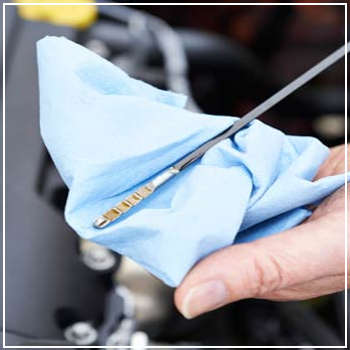If the smell is coming from under the hood, it might be one of your car's hoses or belts that has come loose and is now rubbing against a hot component of the engine. As soon as you notice this, it's important to either fix the hose or replace the belt as soon as possible. Alternatively, the burning rubber smell could be originating from your wheels. If one of them feels unusually hot, it might be because a brake pad or shoe is dragging on the road. Or, if you're driving a manual car, your clutch might be overheating. If it's your wheels causing the issue, consider whether you've been braking hard or driving uphill frequently. If not, it could be that your car's caliper piston is damaged, or you might have accidentally left the parking brake engaged. Sometimes, the "rubber" smell might actually be related to the coolant, which could be leaking into your heating or air conditioning system. At this point, carefully inspect the radiator for any cracks, no matter how small they might be. When you detect this scent, check the dipstick to see if your car is low on oil or if your engine is overheating, which might cause the temperature gauge to display inaccurate readings. If everything checks out, you have two main avenues to explore: look for oil leaks or examine your transmission fluid. In terms of oil leaks, the problem might stem from the engine block or a faulty exhaust pipe. If exhaust gases are entering the cabin, you could be exposed to dangerous levels of carbon monoxide and should address the issue immediately. If it's your transmission, the vacuum modulator might have absorbed some fluid and sent it into the engine. When you notice this smell, which is often compared to the aroma of maple syrup, your car's engine might be overheating. Your temperature gauge or warning light should alert you to this problem, but if they don't, the sensor might be malfunctioning. This distinct odor usually points to one major issue: your catalytic converter, which is part of the exhaust system, isn't functioning properly. At this stage, the catalytic converter itself might be failing, or there could be a more significant problem with your engine. Upon detecting this smell, there's a possibility your car is experiencing electrical issues—such as a short circuit or burned insulation around a wire. Continuing to drive might worsen the situation, so it's wise to seek roadside assistance. This smell also suggests an electrical problem within the engine, as the coating around wires, fuses, or other connection points might be burning. However, the source of the burning could also be literal plastic—a plastic bag or similar debris caught in the engine. Alternatively, it might indicate an issue with your heater: Is your car struggling to start? If you're encountering this problem and catching a whiff of gasoline, you might be dealing with a flooded engine. The smell could also result from fuel leaks in the injection system, carburetor, or fuel pump. In all scenarios, whether you’ve identified the cause or not, it’s crucial to have DaSilva’s team diagnose the issue before proceeding with any repairs. To get started, give us a call today. While this list covers common causes of burning smells in cars, it’s important to remember that each vehicle is unique. Regular maintenance and inspections can help prevent many of these issues from arising in the first place. If you’re unsure about anything, don’t hesitate to reach out to a professional mechanic—they’re always here to help ensure your car runs smoothly and safely. Veterinary Injection Of Antiparasitic Drugs Veterinary Antiparasitic Agents,Injection Of Veterinary Deworming Agents,Injection Of Animal Insecticides,Injection Of Animal Parasite Prevention And Control Henan ShowVet Industrial Co., Ltd. , https://www.cxbt-showvet.com One day, you're cruising along when suddenly you catch a whiff of something burning. Maybe it's accompanied by heat or even smoke emanating from beneath the hood. A "burning smell" from your vehicle can signal a variety of problems, ranging in severity.
One day, you're cruising along when suddenly you catch a whiff of something burning. Maybe it's accompanied by heat or even smoke emanating from beneath the hood. A "burning smell" from your vehicle can signal a variety of problems, ranging in severity.Burning Rubber
Burning Oil
It's Sweet
Rotten Eggs
Burnt Toast
Burning Plastic
You Smell Gasoline
What’s That Burning Smell Coming From My Car?
Veterinary Injection Of Antiparasitic Drugs is an essential method for controlling and preventing parasitic diseases in animals. This approach utilizes various Veterinary Antiparasitic Agents that are specially formulated to target and eliminate parasites effectively. One key application is the Injection Of Veterinary Deworming Agents, which focuses on eradicating internal parasites such as worms that can cause significant health issues in animals. Additionally, the Injection Of Animal Insecticides addresses external parasites, like fleas and ticks, providing a potent solution for managing infestations. The Injection Of Animal Parasite Prevention And Control combines these strategies to offer comprehensive protection, ensuring that animals remain healthy and free from the detrimental effects of parasites. This integrated approach enhances overall animal welfare and helps maintain optimal health standards in veterinary care.
If you need it, we can customize exclusive formulas, packaging, and everything you want for you. If you need a product manual, please contact us. Thank you.